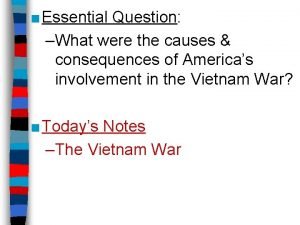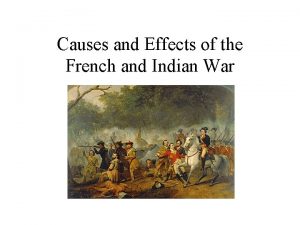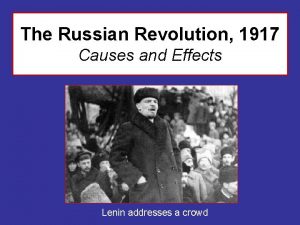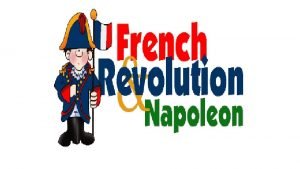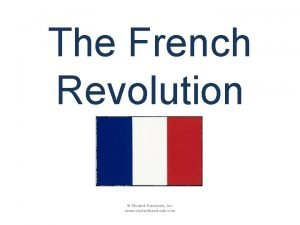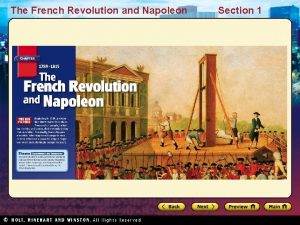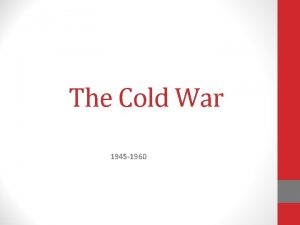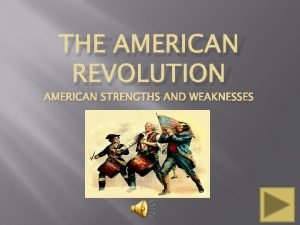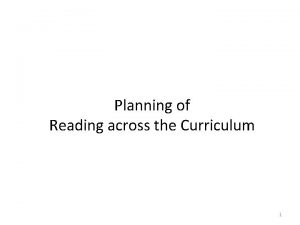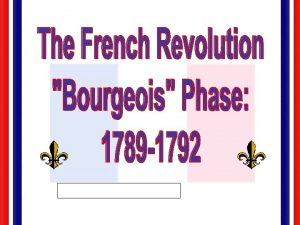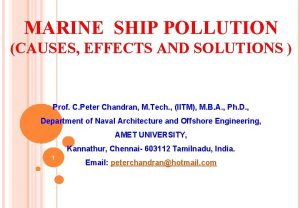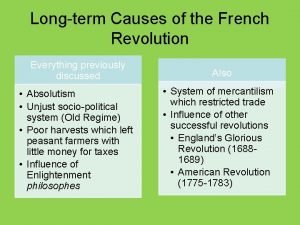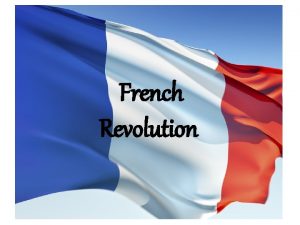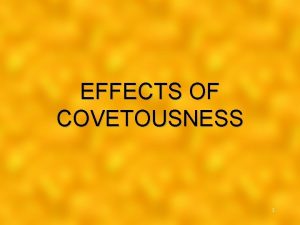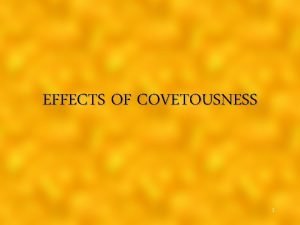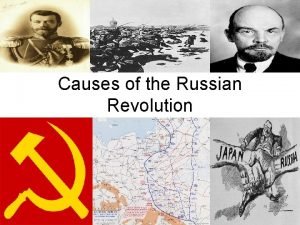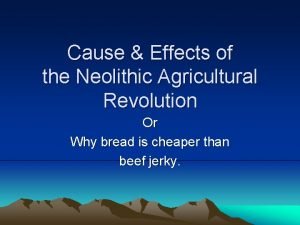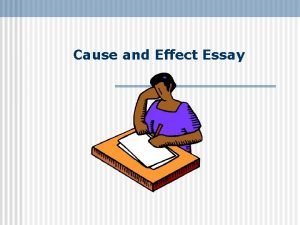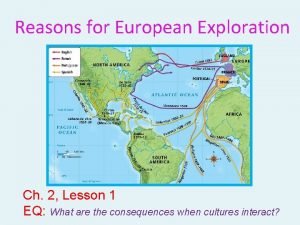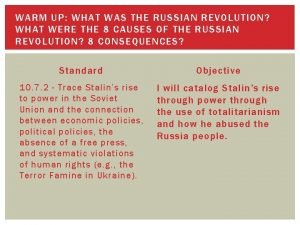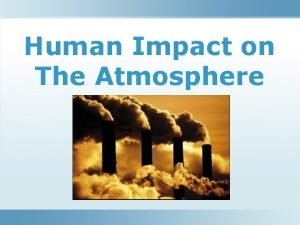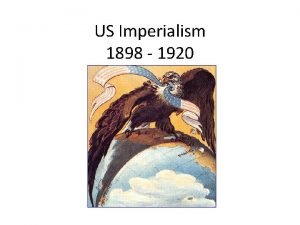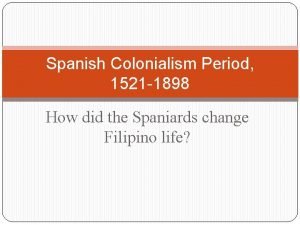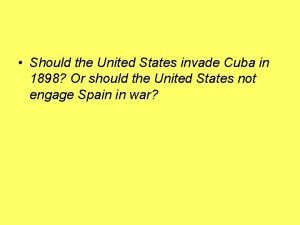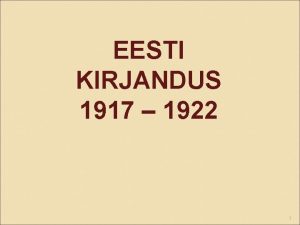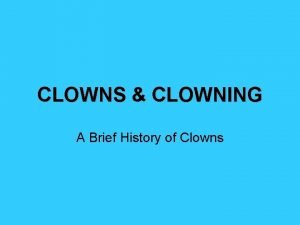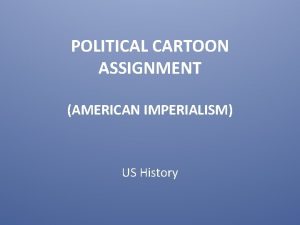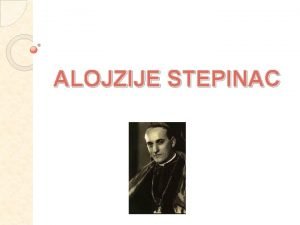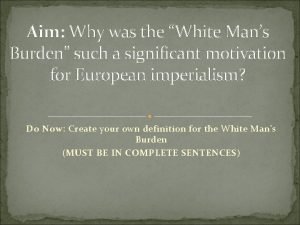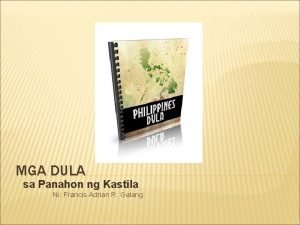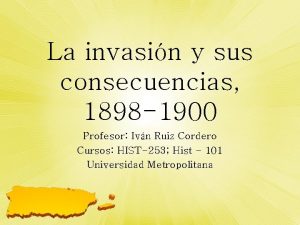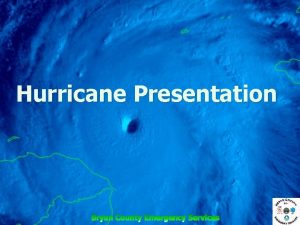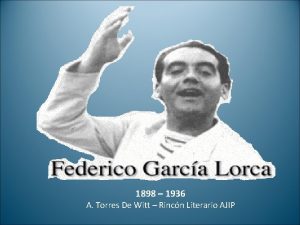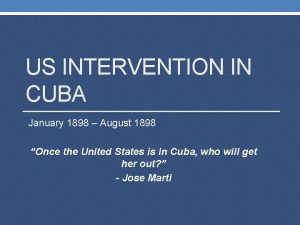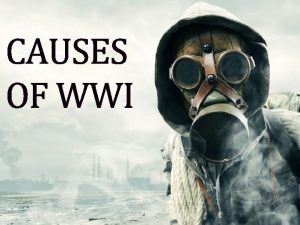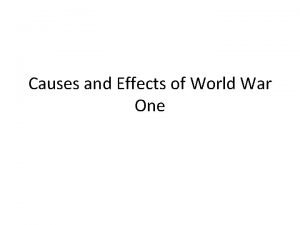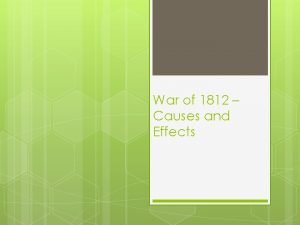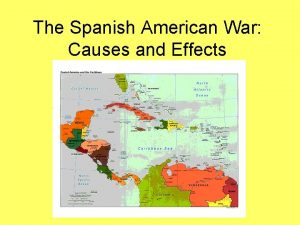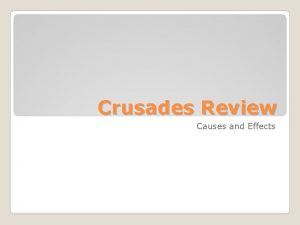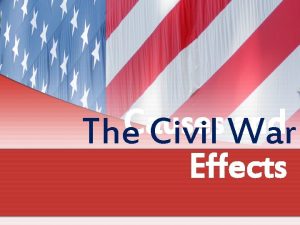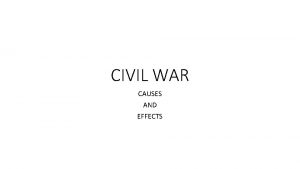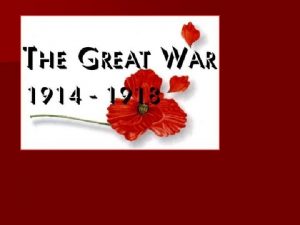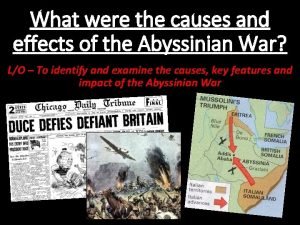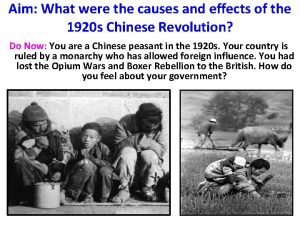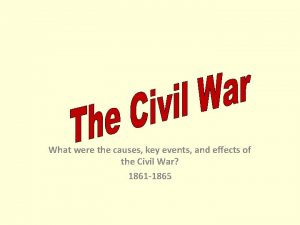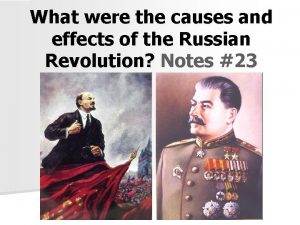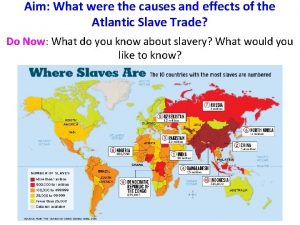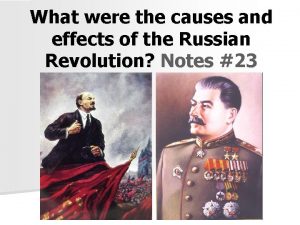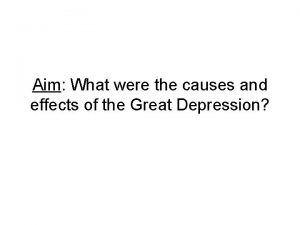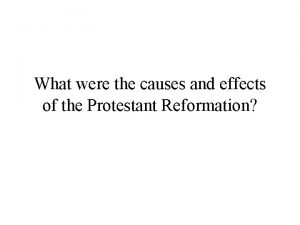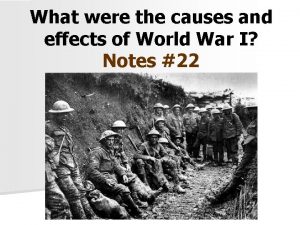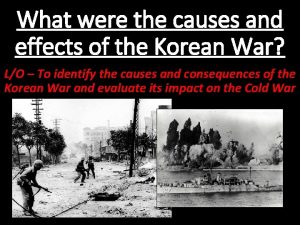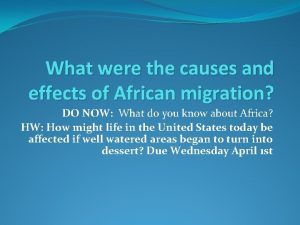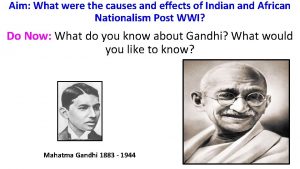1898 What were the causes and effects of





































- Slides: 37

1898 What were the causes and effects of the Spanish-American War?

War Clouds Loom p Cubans had been under Spanish rule since the landing of Columbus in 1492. n The people of Cuba wanted their independence. p In 1868, they staged a revolt that was put down ten years later. p In 1895, a new revolt broke out. § Spain is NOT happy!!! § “It’s time to punish these rebels”


OH NO!!!!! p Spain responded with a policy of reconcentration. p The forced movement of large numbers of people into detention camps for military or political reasons. p After about 200, 000 Cubans died in the camps n Cuban exile Jose Marti appealed to the United States for help.


Images from inside the camp

U. S. Concerned p Many Americans were sympathetic toward the Cuban cause. n The cause drew a parallel to America’s struggle for freedom against the British. n Geographically close. n Media dramatized events. p Others who had money invested in Cuba, wanted the United States to intervene to protect their interests/investments. n American investors were tied to sugar and rice plantations, railroads, and iron mines.


The Power of the Newspaper p Despite all the negative news coming from Cuba, neither President Cleveland nor President Mc. Kinley would intervene. p Newspaper publishers William Randolph Hearst and Joseph Pulitzer tried to provoke American citizens to call for WAR. n “You furnish the pictures, I’ll furnish the war” W. R. Hearst n Headlines sell newspapers!!!! Sold newspapers equals revenue. p Through “yellow journalism”, they ran headlines and stories that played up the horror in Cuba. p Finally, when fighting broke out in Havana, Cuba’s capital city, President Mc. Kinley sent the battleship Maine to protect American lives and property.

What is “yellow journalism? ” YELLOW JOURNALISM: style of reporting and displaying news in a sensational way that distorts the truth

The Newspaper GIANTS!!!!!!

What Happened? p On February 15, 1898, the great ship exploded and sank, taking the lives of 260 men. n Americans blamed Spain, and “REMEMBER THE MAINE” became the battle cry for revenge. p Who do you think sank the Maine? § WHY? ? ?

The BIG question in the news was “Who sank the Maine? ” The U. S. pointed the finger at Spain and Spain pointed the finger back at the U. S. Who would you believe, the Spanish government or your American newspapers? WHY? ?

Who is the Journal placing the blame on for the destruction of the U. S. S. Maine?

U. S. S. Maine Three Weeks before Explosion U. S. S. Maine after Explosion

QUESTIONS • Which of these causes do you believe had the biggest impact on the decision to declare war against Spain by the United States? • Why? • In your opinion, was it necessary for the United States to go to war against Spain?

“A Splendid Little War” A quick a relatively easy victory

The United States Goes to War p Although President Mc. Kinley wanted to make peace with Spain, he finally gave in and asked Congress to declare war on April 11, 1898. n Surprisingly, the first battle was fought NOT in Cuba, but in the Philippines, another Spanish colony. p Where are the Philippines located? Why might the U. S. be interested in the Philippines?


It’s on p Assistant Secretary of the Navy Theodore Roosevelt believed the war would expand, so he telegraphed Commodore George Dewey to move American ships to the Philippines. n Dewey then received help from a Philippine rebel leader, Emilio Aguinaldo, who was already fighting to rid his land of Spanish rule. § Americans soon took control of the islands.




War in Cuba p When the war shifted to Cuba, the main fighting took place near the city of Santiago and at sea. n Theodore Roosevelt, who had given up his navy post, led the Rough Riders unit in a successful charge up San Juan Hill, which became a highlight of the war. The true heroes of the battle

Cuba Falls p The U. S. Navy then destroyed the Spanish fleet trapped in Santiago Harbor. n n Within two weeks, the Spanish surrendered Cuba. The United States then focused their attention on Puerto Rico p U. S. forces invaded Spanish controlled Puerto Rico and quickly brought it under U. S. command.

An American Empire p In December 1898, the United States and Spain signed a peace treaty. n n The treaty that ended the Spanish-American War was called the Treaty of Paris. Cuba gained its independence, but not the true independence it sought (the U. S. now has control of the island) p n The United States paid Spain $20 million and took control of Puerto Rico, the Philippines, and the Pacific islands of Guam and Wake. “A Splendid Little War” = The Spanish-American War p p Fighting lasted about four months Less then 400 Americans dead from combat while more than 4, 000 dead from disease and spoiled food.

Why are some Americans upset? ---------------------------------p Expand means to get bigger. § p Reasons for imperialism- Political, Economic, Religious, Military, Social. Many Americans were unhappy about acquiring colonies, but not the expansionists. n They were eager to open new businesses and to spread the idea of democratic government. ----------------------------------p Many Americans said taking colonies violated the principle of the Declaration of Independence. n Also, acquiring colonies brought the risk of future wars.

The U. S. Becomes a World Power p p The United States replaced Spain as a colonial power in the Caribbean. Cuba was independent in name ONLY. n Congress forced the Cuban government to adopt the Platt Amendment in its constitution. p This amendment limited Cuba’s power and made it a U. S. protectorate § An independent country whose policies are controlled by an outside power.



Free from Spanish rule p The Foraker Act of 1900 n This act gave Puerto Rico limited self-rule, and its people became U. S. citizens. p However, many of the islanders wanted their freedom. Is Puerto Rico a U. S. state? -------What is their connection to the U. S. ?

Why were the Pacific islands important to the United States?

The Philippines p In the Philippines, Emilio Aguinaldo, still seeking independence from foreign rule, led a revolt that resulted in many deaths. n Who was this revolt against? p The United States of America p The U. S. felt the Philippines wasn’t ready for self rule, plus (imperialists/expansionists) saw the potential of the islands location and resources. p In 1901, he was captured and the fighting ended!!!!! So…. . What happened? Did the Philippines get their independence?




The White Man's Burden: The United States and The Philippine Islands (1899) Take up the White Man's burden, Send forth the best ye breed Go bind your sons to exile, to serve your captives' need; To wait in heavy harness, On fluttered folk and wild— Your new-caught, sullen peoples, Half-devil and half-child. Take up the White Man's burden, In patience to abide, To veil the threat of terror And check the show of pride; By open speech and simple, An hundred times made plain To seek another's profit, And work another's gain. Take up the White Man's burden, The savage wars of peace— Fill full the mouth of Famine And bid the sickness cease; And when your goal is nearest The end for others sought, Watch sloth and heathen Folly Bring all your hopes to nought. Take up the White Man's burden, No tawdry rule of kings, But toil of serf and sweeper, The tale of common things. The ports ye shall not enter, The roads ye shall not tread, Go make them with your living, And mark them with your dead. What was the “White Man’s Burden? ” How was it used to defend imperialism? Take up the White Man's burden And reap his old reward: The blame of those ye better, The hate of those ye guard— The cry of hosts ye humour (Ah, slowly!) toward the light: — "Why brought he us from bondage, Our loved Egyptian night? " Take up the White Man's burden, Ye dare not stoop to less— Nor call too loud on Freedom To cloak your weariness; By all ye cry or whisper, By all ye leave or do, The silent, sullen peoples Shall weigh your gods and you. Take up the White Man's burden, Have done with childish days— The lightly proffered laurel, The easy, ungrudged praise. Comes now, to search your manhood, through all the thankless years Cold, edged with dear-bought wisdom, The judgment of your peers!
 What were the causes and effects of the persian war
What were the causes and effects of the persian war What were the causes and effects of the vietnam war
What were the causes and effects of the vietnam war Causes and effects of the french and indian war
Causes and effects of the french and indian war Causes and effects of the russian revolution
Causes and effects of the russian revolution Causes and effects of the french revolution
Causes and effects of the french revolution The effects of the french revolution
The effects of the french revolution French revolution
French revolution Summary of the cold war
Summary of the cold war Strengths of the continental army
Strengths of the continental army French revolution causes and effects
French revolution causes and effects Pollution causes effects and solutions
Pollution causes effects and solutions French revolution causes and effects
French revolution causes and effects Pollution causes effects and solutions
Pollution causes effects and solutions American revolution causes and effects
American revolution causes and effects French revolution causes
French revolution causes Forest fires causes and effects
Forest fires causes and effects What is covetousness?
What is covetousness? What is covetous
What is covetous Effect of russian revolution
Effect of russian revolution Cause and effects of the neolithic revolution
Cause and effects of the neolithic revolution Cause and effect essay chain organization examples
Cause and effect essay chain organization examples Causes and effects of european exploration
Causes and effects of european exploration Russian revolution effects
Russian revolution effects How to calculate inflation rate
How to calculate inflation rate Acid rain causes
Acid rain causes 1898 to 1920
1898 to 1920 Church
Church Why did the united states invade cuba in 1898?
Why did the united states invade cuba in 1898? Panitikan ng estados unidos
Panitikan ng estados unidos La pequeña caperucita roja 1898
La pequeña caperucita roja 1898 Luuletaja 1890-1952
Luuletaja 1890-1952 Where did clowns originate from
Where did clowns originate from Imperialism political cartoon
Imperialism political cartoon Rodio 1898
Rodio 1898 White man's burden cartoon
White man's burden cartoon Salitang espanyol ng sarsuwela
Salitang espanyol ng sarsuwela Consecuencias de la invasion norteamericana 1898
Consecuencias de la invasion norteamericana 1898 1898 georgia hurricane
1898 georgia hurricane

